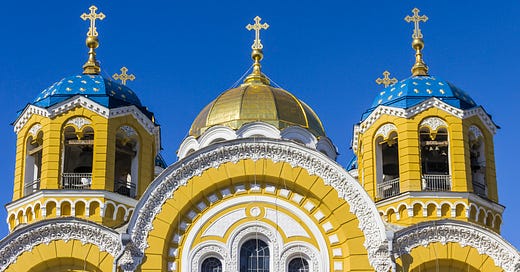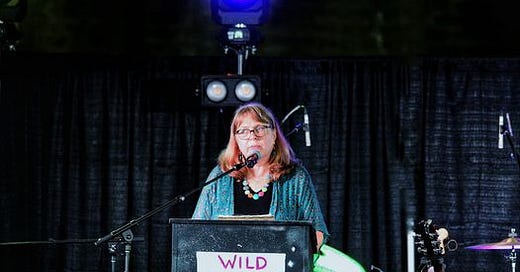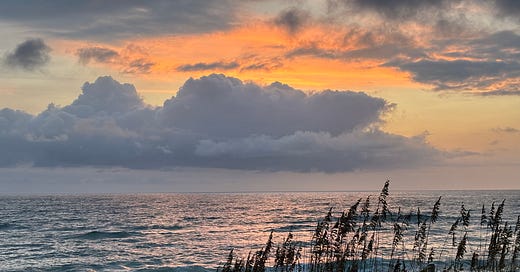While the secular media tries to guess Vladimir Putin’s motives in Ukraine, one important aspect of the current situation has gone largely ignored: Religion.
I’m no expert in Eastern European history, but my training in church history offers a lens into the events in Ukraine. In effect, the world is witnessing a new version of an old tale — the quest to recreate an imperial Christian state, a neo-medieval “Holy Roman Empire” — uniting political, economic, and spiritual power into an entity to control the earthly and heavenly destiny of European peoples.
The dream gripping some quarters of the West is for a coalition to unify religious conservatives into a kind of supra-national neo-Christendom. The theory is to create a partnership between American evangelicals, traditionalist Catholics in western countries, and Orthodox peoples under the auspices of the Russian Orthodox Church in a common front against three enemies — decadent secularism, a rising China, and Islam — for a glorious rebirth of moral purity and Christian culture.
In the United States, Trumpist-religion is most often framed as “Christian nationalism.” It is, indeed, that. But it is also more — it is the American partner of this larger quest for Christian internationalism. No one has articulated this more clearly than Steve Bannon, who, despite his legal troubles, remains a significant force as a kind of philosophical apostle in right-wing Christian circles for a neo-Christendom.
There have been a few bumps on the way to this Humpty-Dumpty hope of reassembling a Christian Roman Empire, however. Interestingly enough (and I’ll leave this to future historians to sort out), American evangelicals bought into this neo-medieval project wholesale, having been prepared for far right nationalism by their fondness for racial and gender hierarchies. The most democratic form of Protestantism will evidently sell its soul to keep black people and women in their “place.”
The hardest partner to recruit to neo-Christendom has been the Catholic Church. The election of Pope Francis in 2013 proved a major stumbling block for the emergence of a right-wing global political order. The new Pope eschewed all such schemes in favor of opening up the church to the poor, outcasts, and the marginalized with a social vision that questions capitalism and the destruction of the Earth. Neo-medieval Catholics — often referred to as “trad Caths” — haven’t taken this well and have mounted a decade of resistance to Francis that may well culminate in something like the Avignon schism of the fourteenth century. So far, however, Pope Francis remains in charge.
Until recently, it appeared that Vladimir Putin had successfully co-opted Orthodoxy into this globalist triumvirate, making for a surprising love fest between American evangelicals and the Russian strongman. Just this week, former Secretary of State and stalwart evangelical Mike Pompeo praised Putin. Outside observers might think Putin was firmly in control of the future of Orthodoxy vis-a-vis neo-Christendom.
Except he wasn’t. The Ukrainian Orthodox had other ideas.
And that’s a real problem. Because when it comes to Russian Orthodoxy, Kyiv is essentially Jerusalem.
More than a thousand years ago, in the 980s, the pagan Prince Vladimir of Kyiv consolidated the Rus people of modern-day Belarus, Russia, and Ukraine into a single realm. When his emissaries reported back to him on the glories of Christian Constantinople, Vladimir converted to their religion, brought his people into the Byzantine church through a mass baptism, and married a Christian imperial princess. Under his rule, Kyiv became a prosperous and peaceful city at the heart of a new Christian empire, complete with churches, courts, monasteries, and schools, as well as civic programs to care for the poor. Known as Vladimir the Great, he was eventually canonized as St. Vladimir and his memory is celebrated by Eastern Orthodox Christians, Catholics, Anglicans, and some Lutherans.
In the 1200s, however, Kyiv suffered a number of assaults from rival Rus princes and Mongol invaders. Many Rus people moved north and east to the newer cities of Vladimir and Moscow where, under the Czars, the Russian church eventually grew to be one of the richest, most powerful churches in the Orthodox world. With the shift, an Orthodox tradition founded under the auspices of Constantinople became a church under the authority of a patriarch in Moscow.
This has created tension between Ukraine and Russia for centuries, in some ways brought to a head in the Soviet period, with rival forms of Orthodoxy either choosing to resist Communism or cooperate with Moscow. When the Soviet Union collapsed, Ukraine had several different Orthodox churches, only one of which was in close relationship to Moscow.
In 2018, two of those Ukrainian churches and some of the Moscow-leaning Orthodox parishes joined in a union and created a newly unified Orthodox Church of Ukraine, a fully independent national ecclesial body under no control from Moscow, with its head in the ancient seat of Orthodoxy in Kyiv.
Putin and the Moscow Russian Orthodox church authorities protested. They’ve been claiming the 1,000 years of Kyiv Christianity as its own — basically appropriating Ukraine’s church history — to the point of erecting a gigantic (and controversial) statue of St. Vladimir outside of the Kremlin. Putin wants the weight of tradition on his side, and St. Vladimir validates both his religious and political aspirations. There should be no doubt that Putin sees himself as a kind of Vladimir the Great II, a candidate for sainthood who is restoring the soul of Holy Mother Russian. The Ukrainians, on the other hand, would like to remind the Russians that they were the birthplace of both Orthodoxy and political unity in Eastern Europe.
Further infuriating Putin is the fact that the Ecumenical Patriarch of Constantinople recognized the Orthodox Church of Ukraine as an independent body. While this fight between Moscow and Kyiv is internally significant for Russians and Ukrainians historically, it also has larger global ramifications for the future. Katherine Kelaidis at Religion Dispatches explains:
On one side of the conflict is the Ecumenical Patriarch of Constantinople, the culturally and linguistically Greek cleric, who has historically claimed leadership of Orthodoxy. For the better part of a century, the Patriarch of Constantinople has moved toward the West and arguably many of its values. Today’s incumbent on the Apostolic Throne of St. Andrew speaks the language of human rights, religious freedom, and trust in science. This position arises in no small part from the Patriarchate’s own precarious role as a representative of minority religion in Turkey.
At the same time, the Patriarch of Moscow, having reclaimed much of his post’s former political influence in a post-Soviet Russia, has taken to spearheading not only the traditionalist Orthodox cause, but acting as support and symbol to religious conservatives around the world.
The conflict in Ukraine is all about religion and what kind of Orthodoxy will shape Eastern Europe and other Orthodox communities around the world (especially in Africa). Religion. This is a crusade, recapturing the Holy Land of Russian Orthodoxy, and defeating the westernized (and decadent) heretics who do not bend the knee to Moscow’s spiritual authority.
If you don’t get that, you don’t get it. Who is going to control the geographical home, the “Jerusalem,” of the Russian church? Moscow? Or Constantinople? And, what does claiming that territory mean for Orthodoxy around the world? Will global Orthodoxy lean toward a more pluralistic and open future, or will it be part of the authoritarian neo-Christendom triumvirate?
We don’t know how this is going to unfold. But — here’s the key point — economic sanctions are unlikely to work if you believe your side is divinely sanctioned. That’s what Putin thinks he’s got: the approval of God.
You just know he wants to celebrate Easter — this one or next — in Kyiv.
Tripp Fuller and I have created a monthly podcast called Ruining Dinner — in which we talk about the news from an unexpected religion angle. TODAY we recorded this month’s offering. It was all Russia, Russia, Russia. And you won’t hear analysis like this anywhere else. If you ever wondered what Steve Bannon and Phyllis Tickle have in common, you won’t want to miss this!
Watch the video on our private YouTube channel:
For AUDIO ONLY PODCAST version click HERE.
INSPIRATION
Stones (excerpts)
— Serhij Zhadan
We speak of the cities we lived in—
that went
into night like ships into the winter sea,
we speak of the cities that suddenly lost their ability to resist—
in front of our
eyes, like a circus show where every acrobat
dies, and so does each laughing clown; enchanted,
you watch,
never turning away (and inconspicuously
on the circus set
you grow up).
* * *
Now we remember: janitors and the night-sellers of bread,
gray, like wrapping paper,
burglerers,
taxi drivers with klaxons instead of hearts,
children who grew up
among the old furniture
(furniture smelled of poplar trees and sea).
Our city of workers and ugly middle-men,
tearjerking market beggars
they cleared
the autumn fog
with their shouts.
We got to soak in the rain
with strangers
on tram stops,
old proletarian quirks, subway cars,
we got to soak in the rain
on cars
loaded with the unemployed
like magazines with cartridges.
* * *
And now we speak of those who took away our cities,
our cities
dying off like house pets,
And now we speak of those who took
our keys
(the keys we used to open the doors of the hospitals,
and walk between light
and dark of the morning pharmacies)
where every morning
the sun
was being set aflame
with all the little pills and painkillers this earth.
* * *
Who came to power in our cities?
Who are these
clowns
that decide
to break the hearts of our houses and let out their warm raspberry blood?
Their politics
is glass splinters which they scatter under their feet,
and make us
follow them.
Now they come
together in their black suits, looking like chimney-sweepers
who have come
to power.
Their politics is ropes instead of ties
on their necks,
firm ropes good for hanging them on when they exit the game.
And now they don’t know where to begin.
(Translated from Ukrainian by Valzhyna Mort)
LENT AT THE COTTAGE
Ash Wednesday is March 2.
Here’s what is planned:
For all subscribers (free and paid): Sunday Musings will focus on lectionary readings with informal reflections and poetry. There will also be occasional mid-week pieces as usual. You needn’t do anything to receive the regular essays and the Sunday Lent posts.
For the paid list only: DAILY LENTEN REFLECTIONS delivered to your inbox! The theme: A Grounded Lent. I’ll take you through forty days from Ash Wednesday to Good Friday (but no separate devotion on Sunday other than Sunday Musings) based on a devotional I originally wrote for the paperback of Grounded — with added material and updated for the Cottage.
If you want to get the DAILY Lenten reflections you can sign-up for a monthly paid subscription for March and April, at $5 per month for a total of $10 to receive all of the devotions — and you can cancel at the end of April (I won’t be offended!).If you can’t afford that and would like the DAILY reflections, please let us know by replying to this email (just hit reply as you would for any email). We’ll give you a complimentary subscription for two months. It is that easy. No one is ever turned away for lack of funds.
For everyone at the Cottage and your friends: A Lenten kick-off with The Cottage, Crackers and Grape Juice, and Homebrewed Christianity called Jesus De/Constructed on Thursday, February 24, at 7:00 p.m. Sign up HERE. This one-night event is free and it will be epic.
For everybody on the planet with a computer: The Cottage and Homebrewed Christianity team up for a 6-week Lenten class on Jesus De/Constructed (same title as above) — on Thursday nights from March 3 through April 7, live lectures, open Q&A, a pop-up learning community, a special SURPRISE podcast with guests from Westar on Jesus scholarship, and recordings available for later viewing.
Information and sign-up HERE. This event is free or a free-will donation. Whatever. So far, more than 2000 people have signed up! Woo hoo! And we want you to join in the journey.


















IMPORTANT contribution to the conversation: A comment that refers to several posts -- It is more than possible - and is historically true to say - that one doesn't need to be personally religious to lead a religious crusade. Rules and leaders have done this for centuries. Putin probably doesn't believe in anything other than himself and money, but he's still conducting a religious crusade. And it may also be the case that his religiosity is caught up in self-aggrandizement and the longer identity of being Russian, so, in that alternate sense, he is religious. "Religious" =/= nice, kind, compassionate or any of those positive virtues.
I linked two articles in this thread about Russian Orthodox global ambitions. The pieces are from a blog called "Public Orthodoxy," which is very informative and thoughtful.